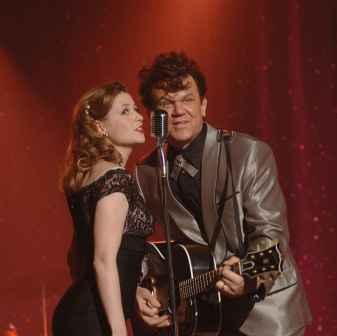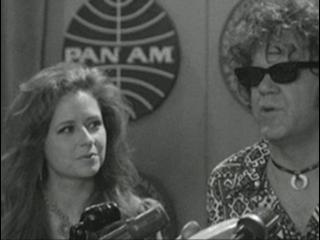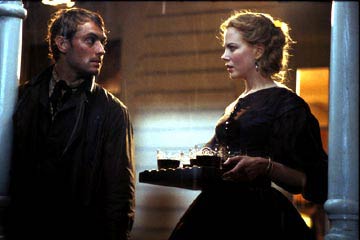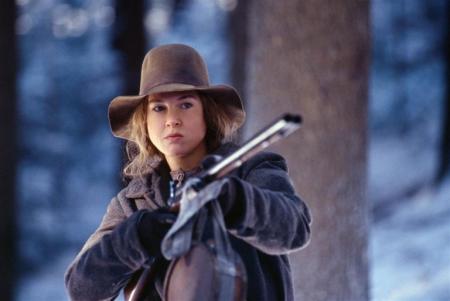Like a resolution dieter in late January, the recently rebooted Bond franchise is starting to lapse back into old habits. Marc Forster’s Quantum of Solace, which I finally caught over the Thanksgiving weekend, is probably a better-than-average entrant in the Bond oeuvre, when considered against all the Brosnan and Dalton movies of years past. As a sequel to the promising reset that was Casino Royale, tho’, Quantum feels too rote by half. Daniel Craig is still probably the best Bond to come down the pike since Connery, but the action-heavy, drama-lite Quantum doesn’t really give him enough to do, other than scowl, grimace, and dodge egregious amounts of automatic weapons fire. Meanwhile, the story — credited to too-many-cooks Paul Haggis, Neal Purvis, and Robert Wade — is both more convoluted and less fun than it needs to be. With the brief exception of Felix Leiter (Jeffrey Wright) treading water in the morally-compromised Dubya-era CIA, Quantum mostly foregoes cloak-and-dagger spy games for 100 minutes of considerably less satisfying Stuff Blowing Up. And, however workmanlike as a run-of-the-mill, mostly nonsensical actioner, Quantum suggests the rebooted franchise may sadly be running out of new ideas sooner rather than later. Take the Bourne out of this Bond, and our man at MI6 is left with very little to hang his hat on.
Things start out promisingly enough, with Bond, maybe half an hour out from when we last saw him, evading black hats at 120mph along scenic stretches of the Italian highway system. (As per the norm, we start in media res.) Then we get the usual hyperstylized credit sequence — bare sand, beautiful women, a strange Jack White/Alicia Keys number which may be a grower — and all seems right in the Bondverse. But, then 007 almost immediately gets involved in a parkour-flavored foot race during the Palio di Siena, one not unlike the several we saw in Casino Royale, and a vague sense of deja vu starts to set in. (This is when arthouse refugee Forster also shows off an overwrought habit, later in evidence at an Austrian production of Tosca, of intercutting his occasionally-inscrutable action sequence with whatever high art or culture is taking place nearby.)
Soon, Bond is given his marching orders — go to Haiti and unearth the dastardly machinations of the elusive secret society QUANTUM, as currently orchestrated by a lithe, mercurial French “environmentalist,” Dominic Greene (Mathieu Almaric of The Diving Bell and the Butterfly.) Along the way, 007 — still seeking revenge for the death of Vesper Lynd — encounters Camille (Olga Kurylenko), a lovely Bolivian secret agent also hell-bent on doling out retribution, in her case for the grisly rape and murder of her family. Can Bond evade the goons of QUANTUM and discover their master plan? Will he find a way to avenge Vesper and put his tortured soul to rest? And will these two alluring agents relinquish their respective thirsts for vengeance long enough to partake in 007’s once-favorite extra-curricular activity? (Surprisingly enough, the answer to that last question is no: I guess that might interfere with all the moping.)
Now, obviously some allowances must be made when it comes to plotting in Bond films — In fact, it was probably worse back in the day, when you just had to take the existence of a volcano lair or moon base at face value. Still, even notwithstanding some of the decisions that lead to shoehorned-in action scenes (At one point, Bond and Camille get into a plane basically just so it can get shot down), Quantum of Solace is a bit of a mess. For one, the whole B-plot — Camille versus the Bolivian despot — frankly isn’t all that interesting, and ultimately verges on the exploitative. (Is there a lazier way of fashioning a villain than making him a rapist? It reminds me of Dave Edelstein’s discussion of the dead child epidemic come Oscar time.) For another, characters show up or are created merely to add emotional beats to the story. (See: Mathis from Casino Royale (Giancarlo Gianinni), or poor Agent Fields (Gemma Arterton), who seems to exist only as a forced nod to Goldfinger and an extended comment on the danger of getting to “know” 007 — But, hey, at least Bond slept with somebody.) For yet another, the Big Bad’s ultimate objective comes across as seriously anti-climactic, and owes more to John Huston in Chinatown than the likes of Blofeld and Dr. Evil.
But the main problem with Quantum in the end is that, while a lot of 007’s old fun-loving side is AWOL here, the film itself has still reverted to the bad Bond habit of relying entirely too much on wildly improbable action sequences rather than espionage intrigue or character-driven drama. I can only watch Britain’s finest miraculously avoid so many sheets of semi-automatic gunfire before I begin to check out, and Quantum crosses that dubious threshold well before its midway point. Now, we’re not back in the land of exploding pens and invisible cars yet, thank goodness — the only snazzy technology in evidence here is the iBigBrother set-up used by MI6 to stay in touch with their operatives in the field. Still, I’m beginning to fear that the powers-that-be behind the new Bond are starting to fall back on the wrong traditions in their oeuvre. And Craig’s 007 deserves a better posting than another slew of sorry Brosnan-like sequels.






